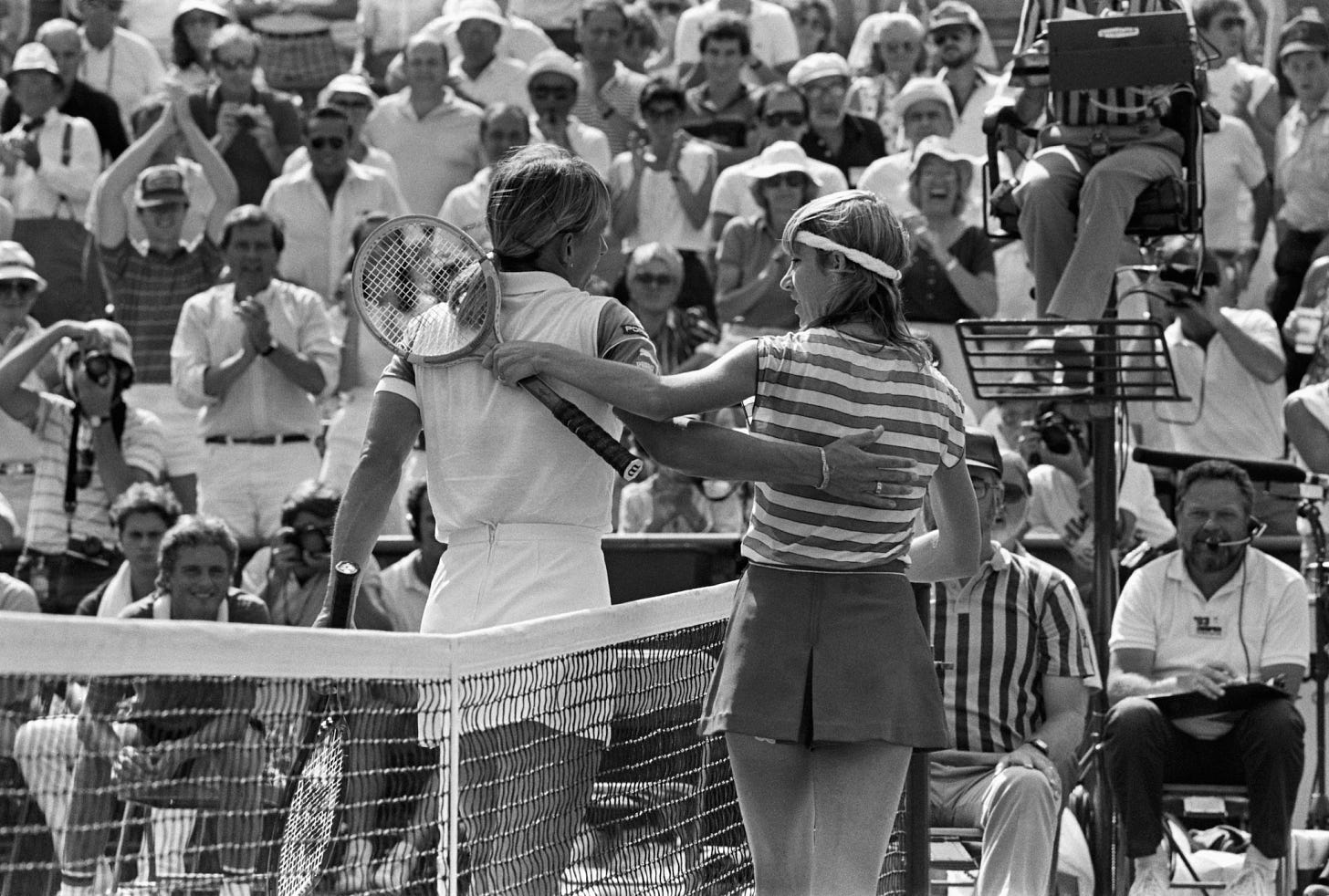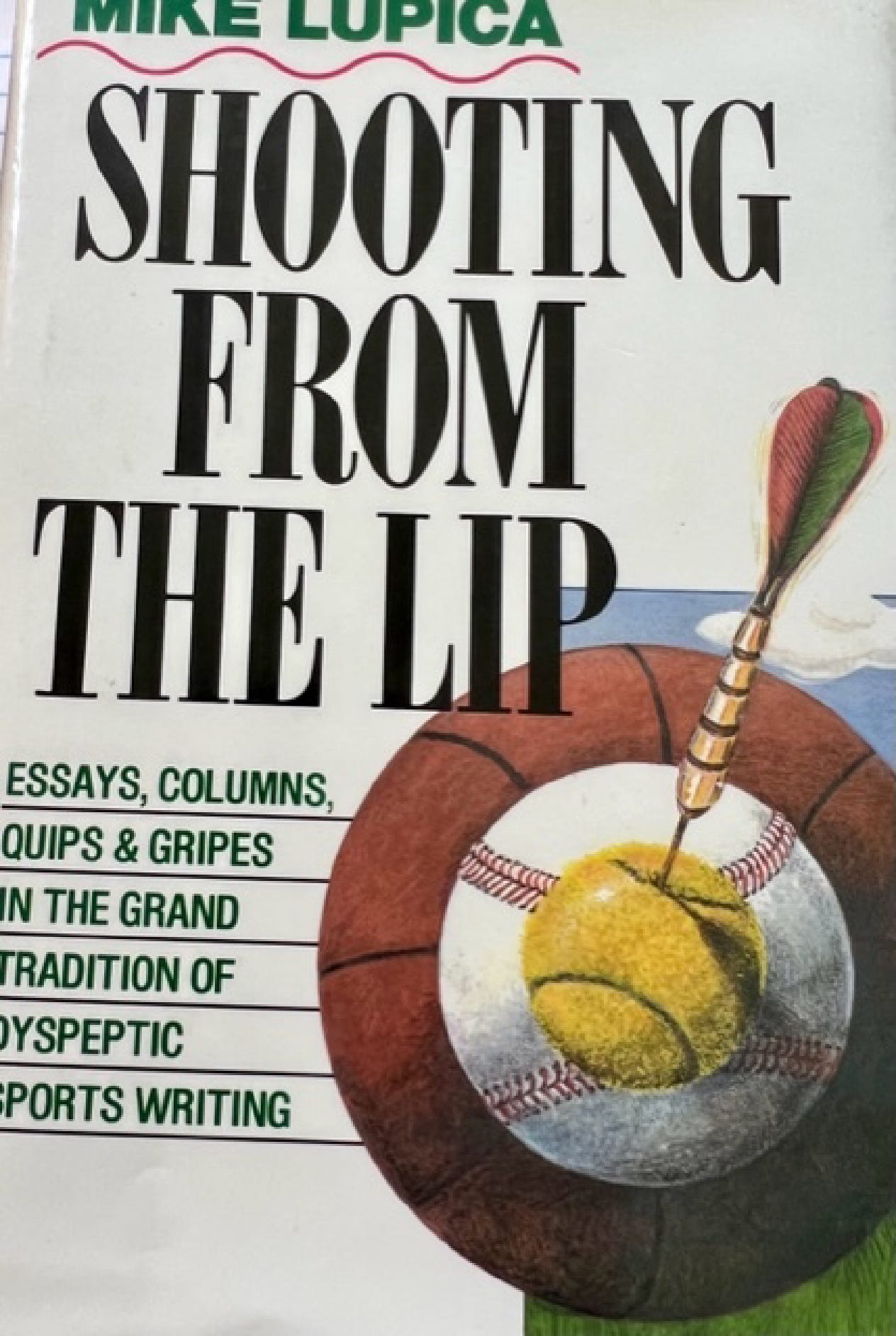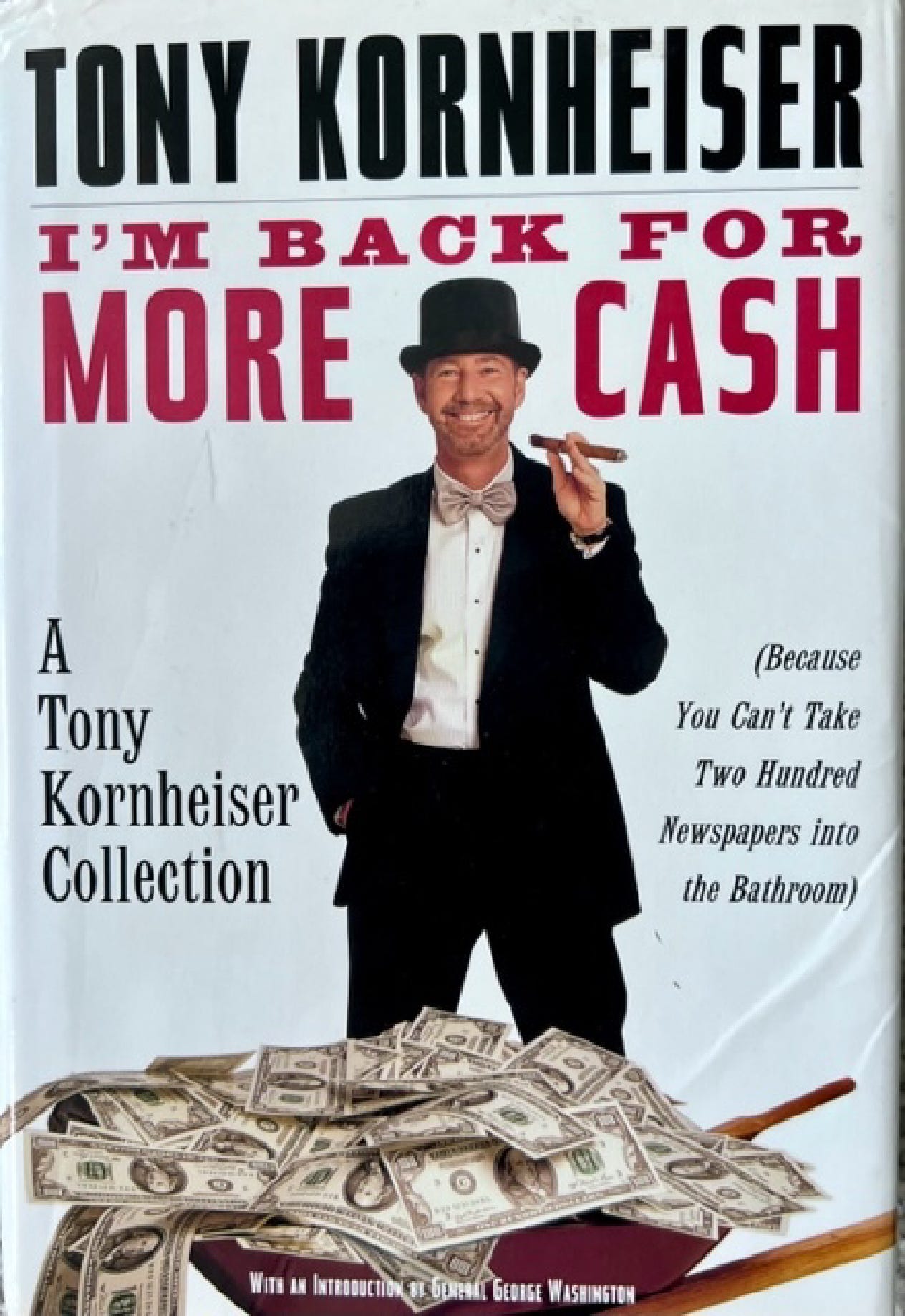(Washington Post, courtesy of Bettman Archive)
*
IF YOU READ JUST ONE THING TODAY, make it this longform exploration of one of the most compelling friendships ever in sports. Chris Evert and Martina Navratilova remade the women’s tennis landscape while remaining close friends. The friendship sustains today, half a century later.
It’s the sort of deep, abiding care for another human being that maybe only marriage and sports can provide. Within the context of the most intense, intimidating competition, their mutual affection and trust survived and thrived. Their ability not only to manage civility but damned near perfect it is a universal lesson not limited to the sports world.
On a late spring day, Evert and Navratilova sat together in an elegant Miami hotel, both finally cancer-free at the end of long dual sieges. Evert was just a few weeks removed from her fourth surgery in 16 months, a reconstruction following a mastectomy she underwent in late January. Navratilova had just finished the last session of a scorching protocol of radiation and chemo, during which she lost 29 pounds. She toyed with a plate of gluten-free pasta, happy to be able to swallow without pain.
It’s fitting that the best sportswriter on the planet would tell this tale. I don’t know Sally Jenkins. She sent me a nice e-mail once, admiring a column I’d done on cyclist Lance Armstrong, with whom she’d recently collaborated on a book. Beyond that, I know her only through her words. They are compassionate and empathetic, but also unsparing on those Jenkins feels violate the bedrock fairness of our games.
Whenever anyone asks me how to write better, I tell them to read good writing. Read for style as much as for content. How does the writer make the words move across the page? How does he or she get from A to Z without stumbling over the other 24 letters?
The best writers tell good stories well. Their words evoke emotion. The way they assemble the words keeps us reading. They take us places we wouldn’t otherwise go.
Evert could not help but be disarmed by this openhearted, unconstrained young woman who seemed hungry to experience … everything. Pancakes. Pool time. Freedom. Friendship. Fast cars.
The good ones pull the stories from their subjects with careful, caring, informed questions. They’re smart and ego-less enough to let their subjects tell their own stories.
“Chris, by her own admission, could only be close friends with people who never had a chance of beating her,” Navratilova says.
Evert hated to play someone she cared about.
*
Writers slump, too, same as athletes. One day, the synapses are firing. Brain and typing fingers are kinfolk. The next day, you’re writing “had went’’ and you want to electrocute your laptop.
During those times, I’ll leave my office, maybe take a walk, maybe commit basketball on the hoop next door. More often, I’d pick up a book from my shelf. I collect compilations. Collections of columns, from the best ever to write them. H.L. Mencken to Rick Reilly, Mike Royko and Jimmy Breslin to Mike Lupica. And Tom Callahan, who used to work at the Enquirer.
*
I’ll re-read my favorite magazine piece. What Do You Think of Ted Williams Now?written a few decades ago by Richard Ben Cramer, for Esquire, never fails to inspire.
I’ll check back in with the Introduction of Pat Conroy’s novel, Beach Music. Page 9, to be exact. That’s when Conroy, as good a contemporary Southern writer as ever lived, takes me to a house on the beach in South Carolina, in the middle of a hurricane. The wind, tides and waves are doing lethal things to the house. The protagonist, a high schooler named Jack McCall, is in the house as the weather does its destructive work. Jack remains, because he is falling in love right that very moment and cares little about dying because he knows dying with Shyla in his arms would be a happy event. So, they danced.
“. . . we danced toward the central motion of our lives. The winds roared and the strange love rose like a tide between us and rested in the crown of waves that was loosening the frame of the house. . .’’
*
Anyway, read Sally Jenkins on Chris and Martina.
ALL OF THIS IS A SELF-INDULGENT way of introducing our Friday Hemingway. Dave Kindred will appear in This Space tomorrow. Dave was Sally Jenkins before Sally Jenkins.
Youse of a certain age might recall Dave writing sports columns for the Louisville Courier-Journal, until the ‘Ville could no longer contain his talent and he moved on to the Washington Post. Dave wrote pretty words. Still does. He was the only idol I ever had in the newspaper business. Filled as it is with egocentric bores, jealous and insecure, the media world doesn’t often allow for praising of colleagues and peers. I’ll say only this, then:
Whenever I was slumping, I’d read Kindred’s stuff first, before all the rest. When I was a pup sports writer, Kindred’s columns inspired me. I’d go to the public library, first in Westminster, MD, then in subsequent way stations in Norfolk, VA, Dallas and New York, find Dave on microfilm and commence allowing the inspiration to flow.
Dave’s work checked all the boxes. His words provoked emotion, honestly. He wasn’t a ranter or a hyperbolist. His writing wasn’t a bid for attention. Dave respected his subjects, even as he could excoriate them. His work was empathetic and curious, his prose was lovely, emotional without being maudlin.
I’ll never forget the column he wrote from the Rose Bowl, the year my beloved Redskins won their first Super Bowl, atop the big shoulders of John Riggins. I still have a column Dave wrote the year Bob Knight’s Hoosiers upset heavily favored North Carolina in the Madness regional. Dave wrote that one on deadline, 700 words in 20 minutes, give or take. Dan Dakich, playing hurt, containing Michael Jordan. Knight coaching his ass off.
Jordan soars, Dave wrote. Dakich limps.
You like to think you never stop learning. I’ll be 85 and still trying to improve my golf swing. And make the words flow more smoothly. If I’m lucky, I’ll still be turning to the likes of Dave Kindred, to show me the way.
He’ll be here tomorrow. Please stop by.
Now, then. . .
AMERICA’S TEAM FIXES INFLATION, pays your medical bills, lowers your taxes, gets the Rights to love the Lefts and, ho hum, wins another ballgame. The winning now seems so assured, doesn’t it? The Reds do what they do, with an impressive consistency that only comes from having done it many, many times before.
I’m talking about fundamentals. Wednesday was a great example, mainly because the Washington Nationals are so-o-o-o not good at them. Before the Reds had batted twice, the Nats already had made two errors. But it wasn’t just that.
DC was just the latest club to make bad decisions against Cincinnati. Their hitters swung at bad pitches, their fielders threw to the wrong base. In general, the Nats played sloppy, indifferent baseball. You can’t do that v. The Club, which plays every game with its collective hair on fire.
This prompts a question:
Why hasn’t someone done a deep dive on the Reds minor league coaches? The kids didn’t show up at the Small Park and immediately start playing smart, aggressive baseball. That stuff has to be taught and reinforced.
For years here, we have clamored for a Reds Way of doing things. Forever, it seemed, the team’s minor leaguers suffered from inconsistent philosophies and approaches. Single-A batting coaches taught one way, Double-A guys taught another, Triple-A a third.
Bryan Price bemoaned the fact that starting pitchers would come from the Reds system to Cincinnati unable to throw a change-up. There was no Way in RedsLand.
So. . . what has happened, and who is responsible? The current Reds play like they mean it. But they’re smart about it, as if they’ve had it drilled into them. Which, you’d think, they have.
Someone tell me more, please.
TUNE O’ THE DAY. . . If you came of age in the mid-70s, a few groups were essential to your coolness. (That is, if you grew up white and suburban.) Elton John was a god, certified. Led Zeppelin was good for scaring your parents, or at least making them scream, “turn that damned music down!’’ several times a day.
Steely Dan was up there. The Eagles, certainly. Fleetwood Mac.
And these guys. This tune isn’t mid-70s, but it’s easily my favorite Chicago effort and never fails to time-machine me back to the summer of 1971.
What song(s) instantly re-connect you to your youth?








That article was my tearjerker of the day ! My daughter is getting her monthly infusion today, so it really hit home. And I agree about Sally !
Ironic that today you would mention how winning has become ho-hum. I looked up from my laptop last night, saw 9-2, and went right back to whatever task I was working on. I mean, how the hell did that happen?! It’s amazing, and a tad scary, complacency being an enemy to sustained success & all. Hopefully that is not the way the club feels - and I’m sure it’s not.
A deep dive into those in charge of developing a consistent & consistently good Reds farm system is very overdue at this point. That would be some good reading…
Speaking of which, not to toot your horn but, eh…you are definitely one of the writers I look to when honing my own craft. Yes, I’ve written a novel and hope to write more. But, I write for a living and finding TML again has been a welcome development lo these last several months. Pat yourself on the back, but don’t pull anything…